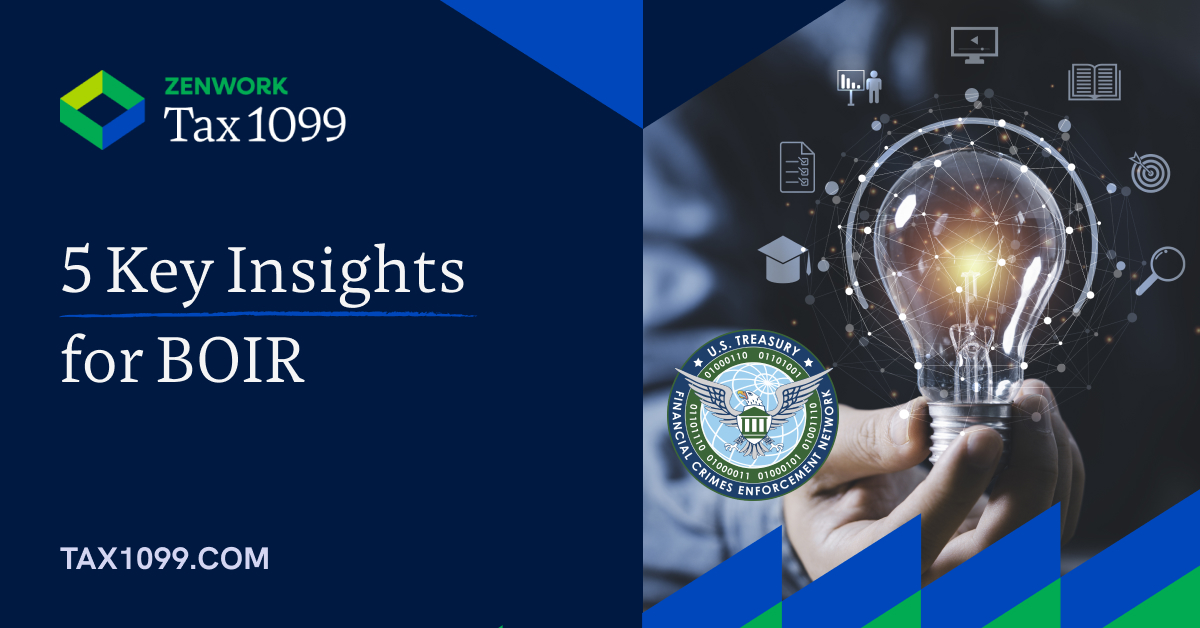The financial and corporate landscape has been changing so thick and fast that it is often challenging to get ownership information. If company ownership structures are infringed, many illicit activities can exploit the financial system exponentially.
That’s why FinCEN has developed beneficial ownership information (BOI) reporting to tackle all these events efficiently. Most businesses, whether small enterprises or corporations, must submit the BOI report to the Financial Crimes Enforcement Network (FinCEN) under the Corporate Transparency Act (CTA). Are you aware of this new rule? If not, you must read this article and explore the significant insights of Beneficial Ownership Information (BOI) reporting.
1. What is Beneficial Ownership Information (BOI) Reporting?
Before understanding the BOI reporting, you have to get a clear idea of BOI. Beneficial ownership information refers to identifying information about the individuals who directly or indirectly own or control a company. It is crucial for assessing risks and promoting transparency in businesses.
BOI reporting is a regulatory requirement aimed at enhancing transparency and combating financial crimes such as money laundering, terrorist financing, and fraud. This comprehensive report includes whereabouts such as the name, address, and identification documents. By adopting this rule of FinCEN BOI reporting, the US govt intends to give a crystal-clear ownership structure and strengthen government oversight of financial activities.
2. Beneficial Ownership Reporting Requirements
There are certain things you must remember regarding the requirements of BOI reporting:
FinCEN began accepting beneficial ownership information reports from reporting companies that are not exempt from January 1, 2024, the effective date of the reporting requirement.
INITIAL REPORTING:
| Existing Companies
Created or registered to do business in the US before January 1, 2024. Reports due by January 1, 2025 |
Newly Created/ Registered Companies
Businesses in the US that are created or registered on or after January 1, 2024. Reports due within 90 calendar days of receiving actual or public notice that the creation or registration of the reporting company is effective |
UPDATED REPORTS
- Required when there is a change to previously reported information about the reporting company itself or its beneficial owners.
- Updated reports due within 30 calendar days after a change occurs.
CORRECTED REPORTS
- Required when previously reported information was inaccurate when filed.
- Corrected reports due within 30 calendar days after the reporting company becomes aware or has reason to know of an inaccuracy.
3. Importance of Beneficial Ownership Information Reporting
The primary aim of reporting BOI is to prevent numerous criminal activities like money laundering and fraud of corporations and limited liability companies. Accurate data about beneficial ownership makes it harder to hide behind or benefit from opaque ownership structures.
The regulatory authority has used this tool to mitigate potential fraud risks. Simultaneously, this measure enhances the trust and credibility of the companies in the marketplace. There is nothing like transparency in a business; BOI reports have proved it once again.
4. Who Needs to File BOI Reports:
This is a big concern for those who are required to file BOI reports. Whether you need to file it or not, let’s find out. There are majorly two different categories of companies that must submit the beneficial ownership information report.
The first one is the domestic reporting companies, such as the entities or the liable companies that are created by the document filed in a secretary of state or any similar office in the United States. The second one is the companies formed by foreign country law and have registered to do business in the US by filing the document with a secretary of state or any similar office.
However, there are 23 exempted categories:
- SEC-Registered Issuers
- U.S. Government Entities
- Banks
- Credit Unions
- Bank Holding Companies
- Money Services Businesses
- Broker-Dealers
- Securities Exchanges
- Clearing Agencies
- Investment Companies
- Investment Advisers
- Venture Capital Fund Advisers
- Insurance Companies
- State-Licensed Insurance Producers
- Commodity Exchange Act Registered Entities
- Public Accounting Firms
- Public Utilities
- Financial Market Utilities
- Pooled Investment Vehicles
- Certain Tax-Exempt Entities
- Large Operating Companies
- Subsidiaries of Exempt Entities
- Inactive Entities
5. Effect of Non-Filling the BOI Reports:
Any company should refrain from going to the path of non-filing or mis-filing BOI reports. If done so, they will have to face severe consequences accordingly. For civil penalties, the amount is $500 and for the criminal penalty, the amount is up to $1000 or up to two years imprisonment.
Conclusion:
A beneficial ownership information report is not a mere regulation but a foundation for building a fair and transparent financial system. Companies should abide by the new rules within the dedicated timeline.
Now get BOI Reporting Service from #1 eFile provider ‘Tax1099‘ to make it easier for you and your clients. The solution is tailored for every entity, including business owners, legal and accounting professionals, and small and medium businesses.
Ready to file your BOI Reports?



